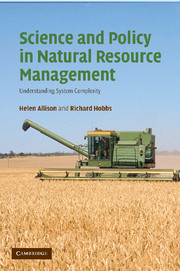Book contents
- Frontmatter
- Contents
- List of illustrations
- List of tables
- Foreword
- Preface
- Acknowledgements
- List of abbreviations
- 1 Introduction
- 2 Historical and policy context
- 3 Natural resource degradation: a resistant problem of the twentieth century
- 4 The epistemology of natural resource management of the twentieth century
- 5 A contemporary epistemology and framework for natural resource management of the twenty-first century
- 6 Model conceptualisation of the Western Australian agricultural region. Part 1: resilience analysis
- 7 Model conceptualisation of the Western Australian agricultural region. Part 2: system dynamics
- 8 Synthesis
- Epilogue
- Glossary
- References
- Index
4 - The epistemology of natural resource management of the twentieth century
Published online by Cambridge University Press: 01 March 2010
- Frontmatter
- Contents
- List of illustrations
- List of tables
- Foreword
- Preface
- Acknowledgements
- List of abbreviations
- 1 Introduction
- 2 Historical and policy context
- 3 Natural resource degradation: a resistant problem of the twentieth century
- 4 The epistemology of natural resource management of the twentieth century
- 5 A contemporary epistemology and framework for natural resource management of the twenty-first century
- 6 Model conceptualisation of the Western Australian agricultural region. Part 1: resilience analysis
- 7 Model conceptualisation of the Western Australian agricultural region. Part 2: system dynamics
- 8 Synthesis
- Epilogue
- Glossary
- References
- Index
Summary
One main aspect of the evolution of human systems is that paradigms – sets of ideas and practices – wear out.
Kenyon B. De Greene, 2000Introduction
Over the past 116 years, natural resource policy and management in the WA agricultural region have failed to resolve some of the most pressing large-scale natural resource management problems. Despite specific policies designed to manage and control the problem it would appear that they have had little effect in changing human behaviour to adopt more sustainable land management practices. Consequently it is proposed that where problems persist in complex social systems, for example the interaction of people and nature in agriculture, it indicates areas in which our mental models consistently fail (Meadows and Robinson, 1985; Jayaratna, 1994; Senge et al., 1994).
The conventional wisdom of the latter part of the twentieth century has operated as if scientific decision-making is objective, neutral and divorced from the social and political domains (Ludwig et al., 2001). Normal disciplinary science was adopted as the dominant intellectual influence on environmental and natural resource management policy (Howlett and Ramesh, 1998; Lubchenco, 1998). However, a growing body of scholarship, supported by social movements for a more democratic science, has contended persuasively that in reality there can be no neat separation of technical facts and social values (Checkland, 1984; Meadows and Robinson, 1985; De Greene, 1993; Blann and Light, 2000a). What we consider to be facts depends ultimately on an accepted paradigm based on social premises. Science is a social activity and scientific knowledge is to a certain extent negotiated and moulded by people's values.
- Type
- Chapter
- Information
- Science and Policy in Natural Resource ManagementUnderstanding System Complexity, pp. 51 - 82Publisher: Cambridge University PressPrint publication year: 2006

